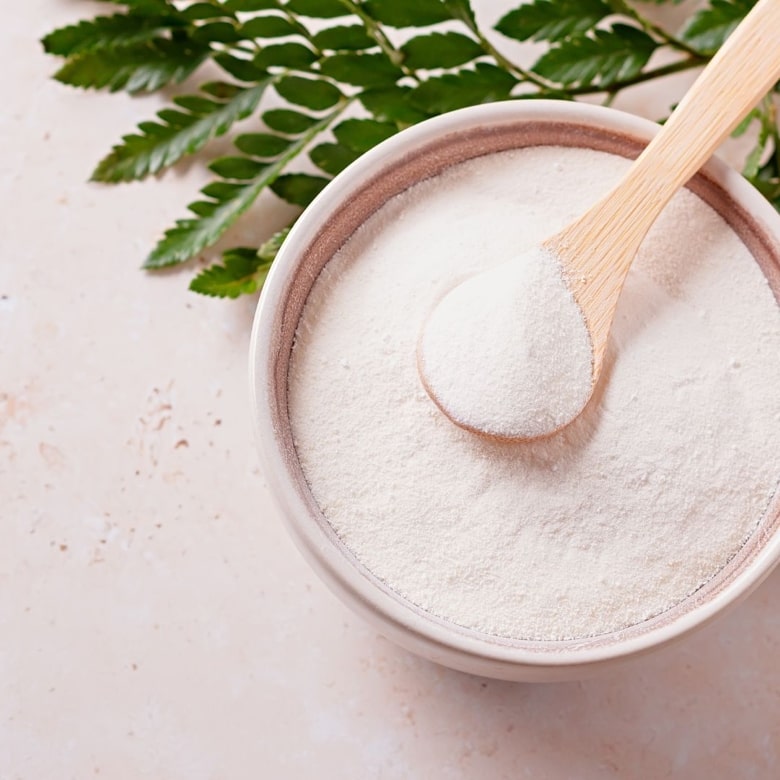Posted on Wednesday, December 27th, 2023 |
The Connection with Collagen and Aging
 Collagen is the most abundant and most fundamental protein in our body. It’s responsible for maintaining skin elasticity, joint health, and tissue growth and integrity.
Collagen is the most abundant and most fundamental protein in our body. It’s responsible for maintaining skin elasticity, joint health, and tissue growth and integrity.
But as we age, the natural production of collagen decreases and can lead to visible signs of aging like wrinkles and joint discomfort.
So understanding the factors that contribute to this decline is important so you can continue to or start to maintain a youthful appearance and overall optimal health.
Factors Affecting Collagen Production
Genetics and Age
This is a natural process but genetics play an important role in determining the rate at which our bodies produce collagen. In advanced aging, the body’s capacity to synthesize the collagen protein diminishes.
This natural process is inevitable and happens to everyone but if you understand some of the controllable factors, you can help reduce its effects.
Environmental Influences
Exposure to ultraviolet (UV) light from the sun significant reduces collagen production. Simply put, UV rays break down collagen fibers which leads to premature skin aging. There are also environmental pollutants and toxins can also impair collagen synthesis.
Here is a brief list of some of the environmental factors affecting collagen production:
- Particulate Matter (PM): Fine dust and soot particles from vehicle exhausts and industrial emissions.
- Ozone (O3): A reactive oxygen species that can cause oxidative stress and damage collagen fibers.
- Tobacco Smoke: Contains a variety of chemicals that can lead to oxidative stress and damage skin cells.
- Heavy Metals: Such as lead, mercury, and arsenic, which can disrupt collagen production and repair.
- Polycyclic Aromatic Hydrocarbons (PAHs): Organic pollutants from burning coal, oil, gas, wood, or garbage.
- Ultraviolet (UV) Radiation: Not a pollutant, but an environmental factor that can significantly degrade collagen fibers.
- Chlorine: Often found in treated water, can cause oxidative stress on the skin.
- Alcohol: Excessive consumption can lead to the generation of free radicals that damage the skin’s collagen.
Stress and Sleep Patterns
Very important! Chronic stress and inadequate sleep are often overlooked factors that affect collagen production. Stress leads to increased cortisol levels, which can break down collagen, while quality sleep is essential for the body’s regenerative processes.
Boosting Collagen Production
Boosting collagen production involves addressing the factors that contribute to its decline. Here, we explore some basic and practical steps to easily boost collagen levels.
Nutritional Support for Collagen
A diet rich in vitamin C, proline, lysine, and antioxidants increases collagen production. Foods such as citrus fruits, berries, green leafy vegetables, and lean meats are excellent sources.
Skin Treatments and Collagen
There are several skin treatments designed to stimulate collagen production. For example PRP Microneedling is a treatment that creates micro-injuries in the skin, triggering the body’s natural healing process and promotes collagen synthesis.
Healthy Lifestyle Practices
Regular exercise, adequate hydration, and avoiding harmful habits like smoking and excessive alcohol is a great start to maintaining optimal collagen levels.
Exercise improves circulation, which aids in nutrient delivery and toxin removal, and thus highly benefits collagen production.
Simple Strategies for Collagen Maintenance
Maintaining collagen levels requires a holistic approach that’s not only about short-term treatments but also about integrating healthy habits into your lifestyle.
- Sun Protection
- Stress Management
- Consistent Skincare Routine
- Regular Health Check-Ups
Embrace a Collagen-Friendly Lifestyle
Take a comprehensive approach to your lifestyle including being mindful of your diet, regular exercise, stress management, and environmental awareness.
If you’re truly interested in stopping collagen depletion and increasing your levels, talk to your skin care practitioner on ways you can slow down its decline and maintain your youthful, healthy skin and joints well into the future.